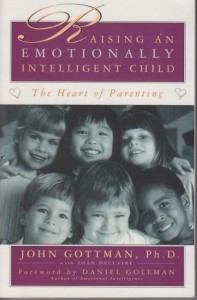Raising an Emotionally Intelligent Child: Review of John Gottman’s book

Review by Kathy Kuhl of Raising an Emotionally Intelligent Child: The Heart of Parenting by John Gottman, Ph.D., with Joan DeClaire. New York: Simon & Schuster, 1997. 220 pages.
How do your children deal with feelings—their own and other people’s? Not being able to deal with emotion wisely can cripple your children’s future. John Gottman, offers practical help based on his decades of research into healthy family relationships.

I’ll admit I approached the subject of emotional awareness and emotion coaching warily. It sounded like it might mean obsessing about feelings. But Gottman quickly explains, “Emotional awareness means you recognize when you are feeling an emotion, you identify your feelings, and you are sensitive to presence of emotions in others.” P. 76
In researching parent-child behavior in detailed laboratory studies, Gottman and his teams at the University of Illinois and the University of Washington discovered one group of children behaved differently than others. They understood and related to others better—even when peers teased them—and were better at building friendships, calming themselves, and focusing their attention.
What made this group different? The team noticed these children had parents who were:
1. Aware of the child’s emotion.
2. Saw expressions of emotion as an opportunity to teach and draw closer together.
3. Listening empathetically.
4. Labeling the emotions in words the children could understand.
5. Helping the children find ways to deal with the problems or situations upsetting them. (p. 24)
Gottman and the team refer to these practices as “emotion coaching.” In this book, Gottman lays out the case for emotion coaching and how to do it.
Far from increasing the tension and drama in the home, these strategies, Gottman claims, help you help your children deal with emotion before it reaches a crisis, and train them to help themselves cope better.
After explaining what this coaching is, Gottman turns to helping your assess your own parenting style and how your parents’ patterns of behavior can affect it. He offers a couple simple questionnaires to help you assess your parenting style and your own emotional awareness, and advice on how to improve it. Next he explains in detail how to coach our children through emotional situations, to listen empathetically, to instruct so you will be heard, to set appropriate limits, and to help them brainstorm. In the chapter on “Marriage, Divorce, and Your Child’s Emotional Health,” he discusses how tension in a marriage affects children and how to protect them through it. The next chapter addresses the vital role of fathers’ involvement with their children, and how to be more effectively involved. In the last chapter, Gottman discusses how emotion coaching changes as the child grows from infant through adolescence. An appendix lists good children’s books that deal with difficult emotions, which can be springboards for conversation.
Though a clinical researcher, Gottman, assisted by Joan DeClaire, does not get technical. Their clear, readable prose is filled with stories and examples to flesh out the concepts.
Gottman comes from a different perspective than I. He has in mind an audience who needs to be told, “The parent-child relationship is not a democracy; it is the parent who determines what behavior is permissible,” which I consider obvious.
For two reasons, I disliked Gottman’s assertion that emotion coaching will be so effective that “you don’t have to resort to negative consequences such as spanking and time-outs to amplify your feelings.” First, I object to his implication that parents only use negative consequences to express their feelings. Parents should not discipline in anger. I think it’s wrong and it make those consequences much less effective. Second, though I didn’t read his book or try his methods while I had children at home, my experience of human nature shows me negative consequences can be effective. In my childrearing, I’ve seen discipline with love, not rage, work well.
That said, I find this to be a very helpful book that is still giving me food for thought. I recommend Raising an Emotionally Intelligent Child: The Heart of Parenting.

